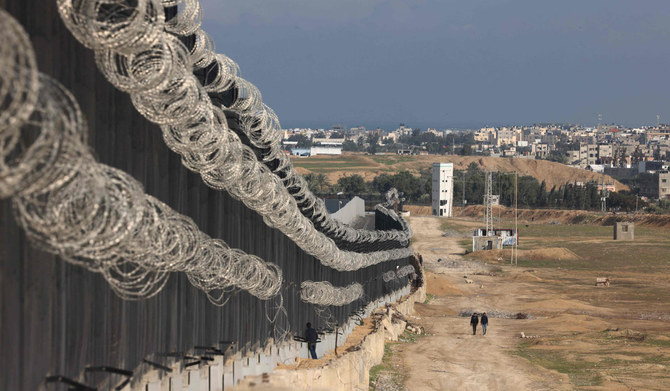MUNICH, GENEVA: The UN’s High Commissioner for Refugees said on Friday that a spillover of refugees from Gaza’s Rafah into Egypt’s Sinai would be a disaster and that Egyptian authorities had made clear that Palestinians should be assisted in the enclave.
“It would be a disaster for the Palestinians ... a disaster for Egypt and a disaster for the future of peace,” Filippo Grandi said on the sidelines of the Munich Security Conference, an annual gathering in the southern German city.
When asked whether Egyptian authorities had contacted the UNHCR about possible contingency plans he said: “The Egyptians said that people should be assisted inside Gaza and we are working on that.”
An exodus of Gazans into Egypt must be “avoided at all costs,” and could be the “nail in the coffin” of a future peace process, he said.
Like many observers, the UN high commissioner for refugees believes that once Palestinians leave Gaza they will no longer be able to return — as happened in 1948 — something which would ruin the possibility of a two-state solution between Israel and the Palestinians.
Filippo Grandi, The UN High Commissioner for Refugees
Nearly 1.5 million displaced Palestinians — more than half of Gaza’s population — are trapped in Rafah, seeking shelter in a sprawling makeshift encampment near the Egyptian border.
“The position of Egypt has been very clear. People should not go across the border. I think Egypt has very valid reasons,” Grandi told BBC television from Munich.
“It would be catastrophic for Palestinians ... to be displaced again.
“It would be catastrophic for Egypt from all points of view, and more important than anything else, a further refugee crisis would be almost the nail in the coffin of a future peace process already.”
Like many observers, the UN high commissioner for refugees believes that once Palestinians leave Gaza they will no longer be able to return — as happened in 1948 — something which would ruin the possibility of a two-state solution between Israel and the Palestinians.
The war accompanying the creation of Israel in 1948 saw 760,000 Palestinians flee or forced from their homes. Millions of their descendants continue to live as refugees in neighboring countries.
“The old 1948 refugee crisis is an unresolved problem; if you add a dimension to that, you can say goodbye to a meaningful peace process,” said Grandi.
Pressure has grown on Egypt to open its border to Palestinian civilians, as Israel plans to push ahead with a military operation in Rafah, seeking complete victory over the Hamas militant group.
Grandi said his Geneva-based UNHCR agency was not involved in any preparations that Egypt might be making if people cross the border.
But in any case, a Gazan refugee surge into Egypt “needs to be avoided and it can only be avoided if humanitarian aid can enter Gaza in significant quantities — but more important, if hostilities cease,” he said.
Grandi said the plight of displaced people in Gaza’s Rafah city was “absolutely dramatic.”
“So I hope that the appeals by the entire international community for a ceasefire and access of humanitarian aid and the liberation of hostages are heeded by the parties; by Israel, by Hamas.”
Egypt has repeatedly raised the alarm over the possibility that Israel’s devastating Gaza offensive could displace Palestinians into Sinai — something Cairo says would be completely unacceptable — echoing warnings from Arab states such as Jordan.
The US has repeatedly said it would oppose any displacement of Palestinians out of Gaza.
A source told Reuters that Egypt was optimistic talks to clinch a ceasefire can avoid any such scenario, but is establishing the area at the border as a temporary and precautionary measure.
Three security sources said Egypt had begun preparing a desert area with some basic facilities which could be used to shelter Palestinians, emphasizing this was a contingency step.
The sources preferred anonymity because of the sensitivity of the matter.
Israel has said it will mount an offensive to take out Hamas’s “last bastion” in Rafah, where well over 1 million Palestinians have sought sanctuary from its devastating Gaza offensive.
Israel has said its army is drawing up a plan to evacuate civilians from Rafah to other parts of the Gaza Strip.
But UN aid chief Martin Griffiths said on Thursday it was an “illusion” to think people in Gaza could evacuate to a safe place and warned of the possibility of Palestinians spilling into Egypt if Israel launches a military operation in Rafah. He called this scenario “a sort of Egyptian nightmare.”
The first source said construction of the camp began three or four days ago and it would offer temporary shelter in any scenario of people crossing the frontier “until a resolution is reached.”



























